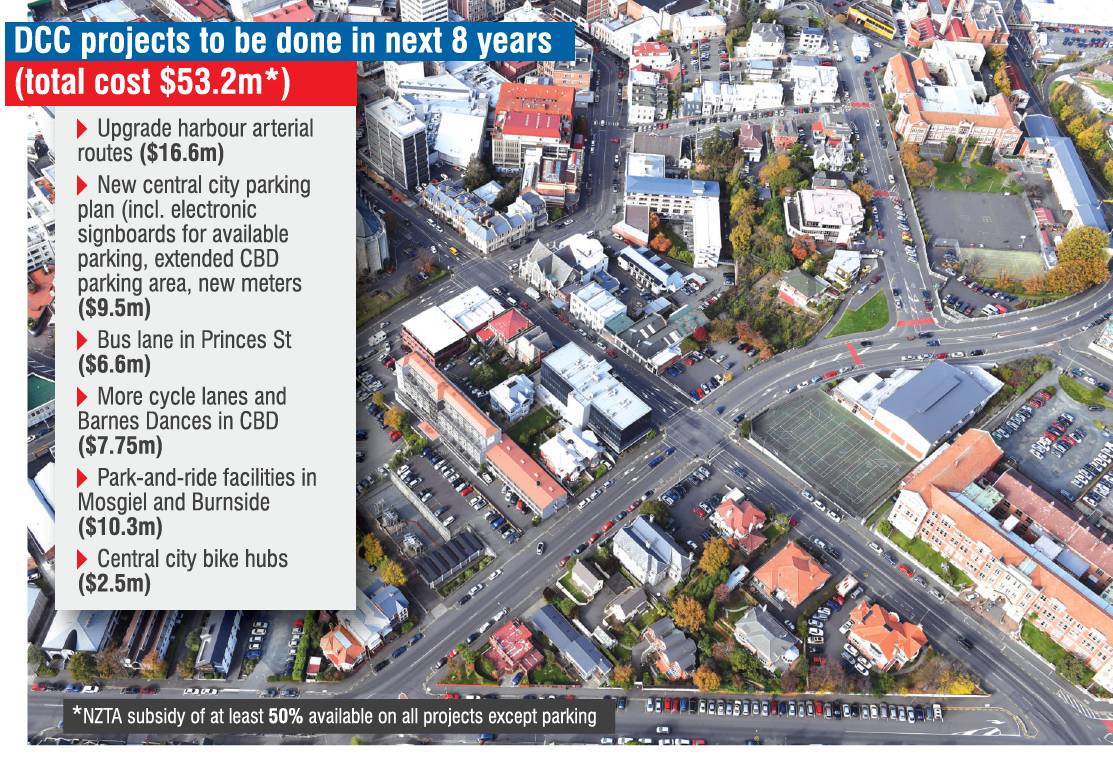
Councillors discussed a report on how staff were working to include reaching the council’s zero carbon goal in all aspects of council work, ahead of drafting a 10-year plan for councillors to consider early next year.
It is the first time the council will review its 10-year budget since setting a target of zero carbon emissions in Dunedin by 2030.
During a two-hour discussion, Cr Carmen Houlahan said she was worried about the costs for ratepayers who could not afford to keep their houses warm that would come with emissions reductions.

The report said costs could arise for people for changes in waste management, transport and making fuel-use systems more efficient.
Cr Andrew Whiley said he hoped central Government would step up and cover some of the costs of reducing emissions, but others disagreed.
It was "time to pay the piper", Cr Chris Staynes said.
"Those of us in [the] last three, four or five generations contributed to the problems we now have to fix.
"The Government is funded by us, it is up to us to pick up the costs.
"One way or another we have to find a way to pay for change."
The cheapest solution to reducing carbon emissions was people changing the way they lived, he said, including using public transport.
"Get on the bus, if you don’t get on buses they will continue to be something that doesn’t provide the service you want."
Mayor Aaron Hawkins said reducing emissions would "absolutely" cost money, but the purpose of the zero carbon work programme was for the council to "take our foot off the accelerator for the people who come behind us".
It was not about asking the Government for money, but holding people to account about decisions they made, he said.
"We need to make sure projects we know will contribute to [zero carbon] aspirations will be funded."
Cr Lee Vandervis said changing the way people got around was fundamental to zero carbon aspirations, but if councillors looked at public feedback it was clear people did not want to use buses or cycleways "as many years of insignificant use shows".
He said aligning with central government "ideology" was flying in the face of public consultation.
"Stop reduction of car parks, fix traffic congestion problems ... represent people rather than an imported ideology."
Council principal policy adviser Jinty MacTavish said public transport was a key opportunity for the city when it came to emissions reduction, as the transport sector was still the largest growing emissions sector.
Cities which had lower emissions had a higher frequency of public transport, she said.
The council was at present carrying out a survey of how it and other large organisations in Dunedin could reduce their emissions.
Cr Jim O’Malley said the challenge for council staff and councillors would be to see how close it could get to its goal.
In January, councillors would receive a final report on the climate 2030 rapid review, a list of possible ways to reduce emissions, a draft infrastructure strategy and a draft zero carbon work programme budget, she said.
All councillors, aside from Cr Vandervis, agreed to note the report.
Advertisement
Comments
And just who is the "Piper" Councilor Staynes? And I take it you want the ratepayer to pay him???
Perhaps that cost could come out of the inflated amount the ratepayer pays you??
Unfortunately we have well-paid council advisors, as well as Councillors, making important decisions about transport emissions, who are totally ignorant about the fact that the average person in a Dunedin bus puts out more carbon than someone by themselves in a large SUV, and 100% more than someone in a small car like a Suzuki Swift.
Agree, diesel busses are not the solution to reducing emissions.
Ship to shore power will half the nation's emissions if we implement this technology in our 6 major ports, but no one wants to know. Instead they think flashing electronic boards with parking info etc will save the day - again i shake my head at the stupidity of our local leadership.
Yes, well said, getting the port companies and shipping to make meaningful reductions in greenhouse gas emissions would make a real difference for this planet's future.
Isn't it odd how those who promote bus use are the least likely to actually use them!
How many councillors use public transport daily? Even Hawkins hitches rides rather than catching the bus!
As usual, the DCC is great at telling other people what to do, and not doing it themselves.
“Of course [climate action is] expensive, of course it’s difficult, it will require thought and change and action, people will say it’s impossible and it can’t be done, and my message to you all this morning is that they are wrong… I hope [2020] will be a defining year of action for our country, and indeed for our planet, on tackling climate change...” - Boris Johnson.
However in terms of climate action I fear 2020 will be known as the year of hot-air with no action, especially from New Zealand!













